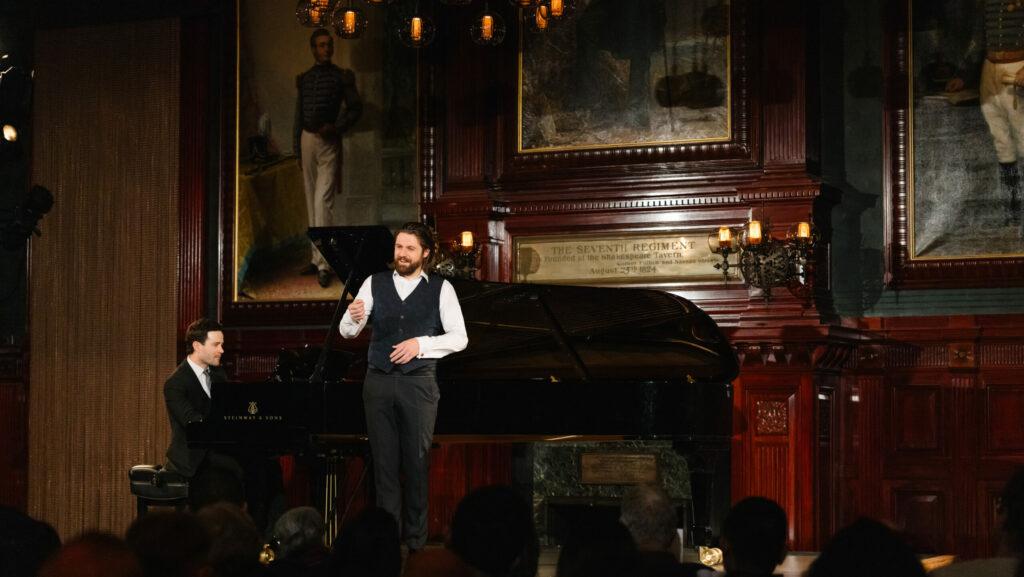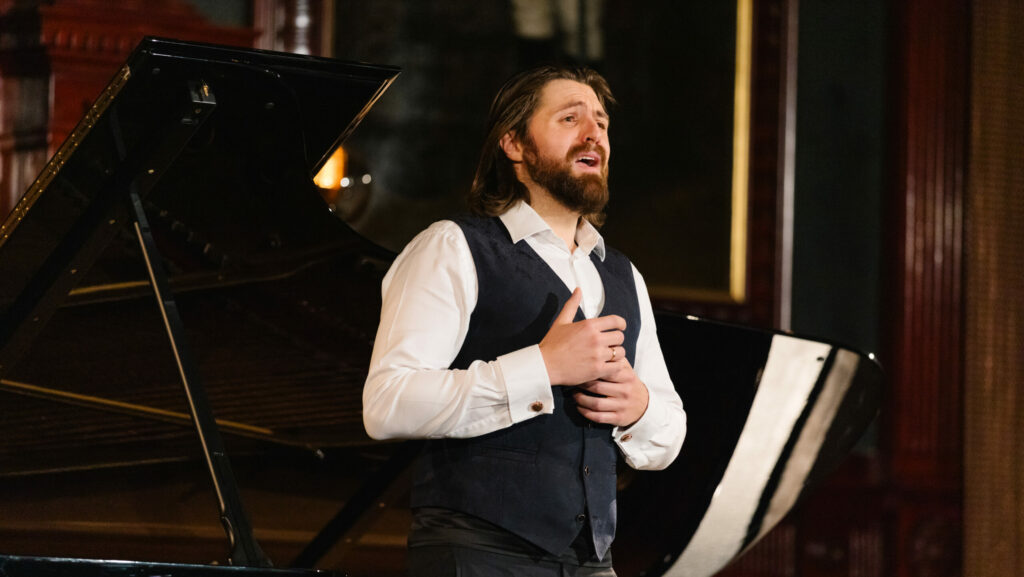
Da Ping Luo
First was the thrill of hearing a truly great singer and great artist in live performance. (Those two characteristics should go together, of course, but as we know they don’t always.) But equally elating was the sense that the song recital form—a real song recital—is still alive.
Before I say more about Krimmel, allow me a moment on my soap box to say what I believe a recital is not. It’s not something in 3,000 seat theatre. It’s not an opera singer going through 40 minutes of randomly patched-together songs just to get to some opera aria encores that are the event’s transparent raison d’être. It’s also not a lecture, nor is it multi-disciplinary. (The previous week, I had attended a Philadelphia song program that included—in addition to a baritone singing Brahms’s Schöne Magelone—an on-stage storyteller and a visual artist creating paintings during the songs.)
For me, a real song recital should be intimate, thoughtful, cohesive. It doesn’t need to be solemn, but it isserious. The artists (both singer and, usually, pianist) certainly contribute their own interpretive profiles, but the sense that they are conduits for the music and the texts is always central.
All this was and more was fully in place here, starting with the venue. The Board of Officers Room at the Park Avenue Armory is both beautiful and very intimate. It’s a surprising and modest choice for a rising star’s debut, but perfect for the kind of focused interaction a song recital requires, and it allowed the artists to explore a palette of musical colors and dynamics that can be very pointed, small scale, and personal.
Krimmel and his superb pianist, Ammiel Bushakevitz, took full advantage of this intimacy from the first notes of a Schubert group that emerged almost as something wistfully overheard. The initial selections included among others, “Der Wanderer,” “An den Mond,” and “Der Jüngling an der Quelle.”
All are nostalgic evocations suggesting solitude amidst nature and were perfectly calibrated here. Even at low volume, Krimmel’s lyric baritone has full resonance, his mood painting is deeply engaged, and his diction exemplary. (For the record, the Ulm-born singer describes himself as “German-Romanian.”)
Moving into a second group of Lieder—these by Carl Loewe—there was an audible increase in volume, matching texts that also dealt with larger stories. Central here were two Goethe’s settings on an almost epic scale: “Totentanz” and especially “Erlkönig,” which require the masterful and bold storytelling that they received.
An additional group of Schubert would be the fourth and final set after intermission, but before that came an intriguing musical and linguistic departure with Ralph Vaughan Williams’s “Songs of Travel.”
It’s a beautiful cycle that continues the poetic journeys into the self and nature, though of course in English—and probably most familiar to us through native speakers, including superb recent recordings by Bryn Terfeland Gerald Finley. Both of them make more of the words; Krimmel’s command of the language is considerable but audibly not native. Substantial rewards came in the tonal lushness and amplitude; there have been more idiomatic readings of this cycle, but surely not many (or even any) more beautiful.

Da Ping Luo
Returning to Schubert for the final group, Krimmel and Bushakevitz concluded with a towering reading of this more familiar—indeed iconic—setting of “Erlkönig.” It was fascinating to compare not only the different musical worlds of the two, but also the ways in which Krimmel interpreted them. While he applied more notable individual character touches in the Schubert—particularly a kind of sneering bite to the Erlkönig himself—he emphasized the narrative arc rather than individual portraits. It certainly worked its magic.
The enthusiastic audience was rewarded with a single elegant encore, which again seemed to capture Krimmel’s modesty. In a couple of quiet sentences — his only speaking in the evening — he introduced Vaughan Williams’s elegiac “Silent Noon.”
I’m sure the audience would happily have stayed for many more, and indeed this important debut still leaves some questions. Responsive as Krimmel was to the serious moods here, there was nothing that showed humor or a lighter side. And ringing as the voice was in the Board of Officers Room, we’ll want to hear how he vocally negotiates a larger space and a full orchestra. (My sense is that Krimmel is first and foremost a Lieder singer, though he’s done a number of operatic roles, with a debut as Don Giovanni coming soon.)
I’m sure I’m not alone in anticipating with excitement whatever is coming next for Krimmel in his American career. Things are certainly off to joyful start.


